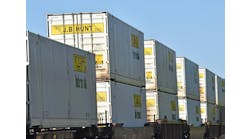As more fleets incorporate telematics into their day-to-day operations, this connectivity becomes a powerful tool that can deliver a range of benefits for better fleet management. The industry as a whole has evolved beyond basic track-and-trace capabilities, and today's telematics solutions are sophisticated interactive asset management tools that deliver insight like fleets have never had before. These connected solutions give fleets the ability to protect their assets, improve their response times and manage their operating costs while maintaining the highest food safety and quality standards.
Visibility Improves Asset Utilization
Whether on the road or in the yard, telematics ensures connectivity on-the-go and gives refrigerated fleet managers or maintenance managers information when they need it and where they need it.
Most solutions provide the ability to monitor trailer movement and position, and create geo-fences around important pick-up, drop-off and maintenance locations. These features help to pinpoint how long assets are stationary in certain locations, and how much refrigeration units are utilized while stationary. This data is critical to managing overall asset operation parameters and also helps to identify unauthorized usage. With telematics solutions, fleet managers know where their units are at all times and this level of visibility provides the pertinent information needed to effectively schedule, control and manage operations, and improve overall asset utilization and fleet productivity.
Increasing Uptime
For refrigerated fleets, a delayed response time can result in a lost load. By monitoring data provided by tracking systems, real-time engine hours and reefer alarms data can be utilized to assess unit health. These analytics help fleet managers and maintenance managers make informed decisions specific to the fleet to better manage maintenance schedules and costs.
When this data is further integrated into fleet maintenance management systems, it helps with maintenance planning and scheduling, and is a good example of how to fully optimize telematics data. The ability to remotely download the refrigeration unit datalogger to get a more in-depth view of refrigeration unit health further enhances maintenance efficiencies and asset uptime.
Analytics for Predictive Maintenance
Preventative maintenance saves valuable time, and it also takes the unknown out of maintenance pricing so fleets can better control costs and route trucks to the nearest service location.
Refrigeration units need regular maintenance to deliver maximum performance and ensure that valuable loads arrive on-time and in optimal condition. Customizable electronic tracking allows users to create a personalized view of their fleet to optimize—and manage—maintenance to ensure preventative maintenance schedule compliance, avoid unexpected breakdowns, extend system life and ultimately save time and money. Combined with a guaranteed maintenance program, telematics can help eliminate the guesswork.
Value with Data Integration
Sophisticated temperature and asset management solutions can integrate temperature data, refrigeration unit operating parameters and trailer locations to give fleets the ability to monitor critical cargo and their refrigeration equipment through the dispatch process from pickup through delivery. Integration of temperature and reefer alarms door status, fuel level notifications is where refrigerated fleets often find the greatest value. These notifications help fleet managers monitor unauthorized or extended usage of their refrigerated trailers as well as manage fuel usage and costs.
Prior to dispatching assets, fleet managers can confirm their units are alarm-free, fully fueled and ready for their journey with the knowledge that these essential elements are monitored to the point of delivery.
Data for Food Safety
With the implementation of the Food Safety Modernization Act (FSMA), telematics is critical for fleets to manage cargo temperature as required by their shippers, including proving the trailers were pre-cooled. Recording, demonstrating and retaining temperature control data for 12 months is an important proof of compliance element required within FSMA.
Fleets will want to consider telematics systems that provide reporting capabilities that can generate custom reports that feature critical data useful for reducing the incidence of expensive spoilage claims and the potential of litigation. FSMA rulings have made it vital for fleets to have temperature management systems in order to prove that perishable goods are transported safely and accurately.
Search for the Right Solution
Because every fleet is unique, fleets should partner with a telematics solutions provider that understands their refrigerated transport business and offers a flexible solution customized to their needs. Fleet managers today should expect a telematics solution to help drive cost out of their operations, improve asset utilization and increase overall fleet productivity and efficiency.
Gayatri Abbott is the connected solutions product manager for Thermo King North America, a manufacturer of transport temperature control solutions for a variety of mobile applications and a brand of Ingersoll Rand.




